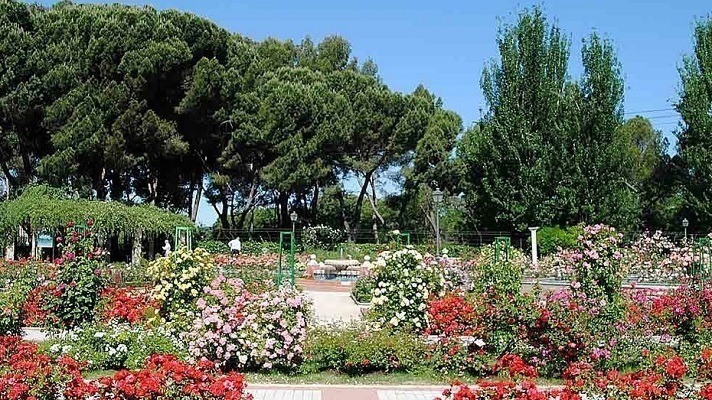On uncertainty, stress, emotion regulation, and carpe diem

Rosaleda at Parque del Oeste in Madrid, Spain
Ever since it began, the pandemic has been a crash course in uncertainty. Safe behaviors, school openings, vaccination timelines, the job market, new variants—these have all seemed to change on a weekly basis, threatening our sense of security and stability.
Uncertainty is stressful and perhaps even harmful to our health, research suggests, and it can drive us to cling to our social groups to the exclusion of others. But a new study has uncovered a surprising upside to feeling uncertain: It might drive us to appreciate the little things in life.
In one experiment, researchers stationed on a sidewalk handed out flyers that said one of two things: “Life is unpredictable: Stop and smell the roses” or “Life is constant: Stop and smell the roses.” A short distance away was a table with a dozen red roses on it and a sign matching the flyer they’d just received.
Research assistants hid behind a bush to see who stopped and who didn’t—and it was the people who read that life is unpredictable who buried their noses in the fragrant flowers, 2.5 times more often than the others.
Why? Savoring and appreciating the small things in life may be a coping response that our minds activate when we feel overwhelmed by the ambiguity of it all. Savoring pulls us out of fears and worries about a fuzzy future and into the clear, pleasurable sensations of right now.
“If the world is uncertain, it makes sense to take advantage of what you have now because it may not exist shortly,” explains Andrew L. Gregory, the lead author of the study.
The researchers found similar results in another experiment, where, instead of handing out flyers, they recruited nearly 400 people to watch videos. Some saw a video purportedly describing the conclusions from a scientific conference about how unpredictable and random our lives are, accompanied by chaotic graphs and rolling dice. Others saw a similar video, but with the opposite message, about life’s underlying order and structure. A final group saw a video about the history of trains.
Compared to the other two groups, those who watched the chaos video reported more intentions to savor life. They said that they should enjoy the present and appreciate simple things, and would linger on good feelings if something wonderful happened to them or a friend.
A final set of findings suggests that this effect does translate to everyday life, even if you don’t happen to come across a video or flyer about uncertainty. Here, researchers recruited over 6,000 people and pinged them up to a dozen times a day, asking how chaotic and unpredictable the world felt in that moment and whether they were savoring the present.
It turned out that when the world felt messy, people were more likely to be savoring their lives a few hours later, at the next ping.
Of course, the relentless uncertainty of the pandemic doesn’t lend itself to feeling mindful and appreciative all the time. But Gregory suspects that this pattern still holds.
Indeed, many people reported feeling grateful early on in the pandemic. One of our Thnx4 members, for example, journaled about missing out on her daily socializing at the neighborhood café and instead making small talk with strangers on her morning walk. “It reminded me not only to appreciate but to seek positive experience,” she wrote.
While savoring may happen naturally, it’s also something we can practice deliberately when life feels unsettling. For example, you might share your good news or gratitude with others, or tune into the enjoyable sights, sounds, and smells around you. When you work on controlling your attention this way, Gregory says, you may feel like you have more control over your life in general.
 – Kira M. Newman is the managing editor of Greater Good. Based at UC-Berkeley, Greater Good highlights ground breaking scientific research into the roots of compassion and altruism. Copyright Greater Good.
– Kira M. Newman is the managing editor of Greater Good. Based at UC-Berkeley, Greater Good highlights ground breaking scientific research into the roots of compassion and altruism. Copyright Greater Good.
The Study:
Be here now: Perceptions of uncertainty enhance savoring (Emotion). From the Abstract:
- Savoring—an emotion-regulation strategy that involves deliberately upregulating positive affect—has many benefits, but what enhances savoring in the present moment? Drawing from life-history theory, affective and developmental science, and social-psychological frameworks, we examined the idea that perceptions of uncertainty––perceiving the world as random and unpredictable—enhance subsequent savoring. In a large experience-sampling study (Study 1, N = 6,680), we found that individuals who perceived more uncertainty showed increases in subsequent savoring in their daily lives. In a preregistered experiment (Study 2, N = 397), individuals who watched a film that induced uncertainty (vs. order or a control condition) subsequently reported higher savoring intentions. Finally, in a field experiment on a busy urban street (Study 3, N = 201), we found that passersby who received fliers that induced uncertainty (vs. order) subsequently engaged in more savoring behavior by stopping to smell a bouquet of roses. These findings from three studies with diverse samples and methodologies underscore an upside to the specter of uncertainty: it can cause people to savor the positives of the present.
The Study in Context:
- New book on how to practice mindfulness meditation with humor and playfulness
- To lower stress levels and improve problem-solving, practice cognitive reframing instead of venting
- Six tips to build resilience and prevent brain-damaging stress
- Study: A combined teaching + app gratitude program helps adolescents address anxiety and improve mental health
- Test your stress level with this quick brain teaser


